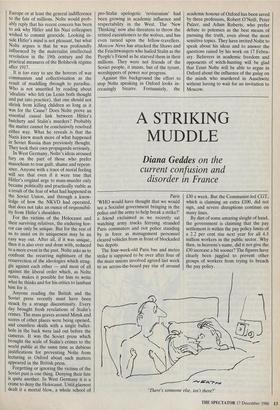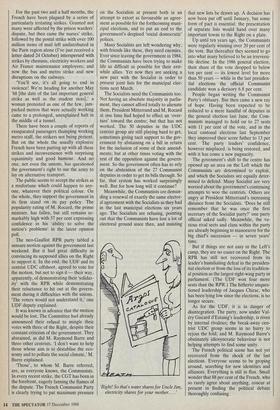A STRIKING MUDDLE
Diana Geddes on the
current confusion and disorder in France
Paris 'WHO would have thought that we would see a Socialist government bringing in the police and the army to help break a strike?' a friend exclaimed as we recently sat watching army trucks ferrying stranded Paris commuters and riot police standing by in force as management personnel cleared vehicles from in front of blockaded bus depots. The four-week-old Paris bus and metro strike is supposed to be over after four of the main unions involved agreed last week to an across-the-board pay rise of around £30 a week. But the Communist-led CGT, which is claiming an extra £100, did not sign, and severe disruptions continue on many lines.
By dint of some amazing sleight of hand, the government is claiming that the pay settlement is within the pay policy limits of a 2.2 per cent rise next year for all 4.5 million workers in the public sector. Why then, in heavens's name, did it not give the £30 increase a bit sooner? The figures have clearly been juggled to prevent other groups of workers from trying to breach the pay policy.
'There's someone else, isn't there?' For the past two and a half months, the French have been plagued by a series of particularly irritating strikes. Granted not many were affected by the prison warders' dispute, but then came the nurses' strike, followed by the postal strike with over 100 million items of mail left undistributed in the Paris region alone (I've just received a letter dated 24 October) interspersed with strikes by chemists, electricity workers and Air France maintenance employees; and now the bus and metro strike and new disruptions on the railways.
`You'll see, it's all going to end in violence! We're heading for another May '68 [the date of the last important general strike as well as the student riots],' a woman protested as one of the few, jam- packed metros that were actually working came to a prolonged, unexplained halt in the middle of a tunnel.
There have been a couple of reports of exasparated passengers thumping working metro staff, the strikers not being present. But on the whole the usually explosive French have been putting up with all these strikes and inconvenience with surprising equanimity and good humour. And no one, not even the unions, has questioned the government's right to use the army to lay on alternative transport.
The public seems to accept the strikes as a misfortune which could happen to any- one, whatever their political colour. On the whole, they support the government in its firm stand on its pay policy. The popularity rating of M. Rocard, the prime minister, has fallen, but still remains re- markably high with 57 per cent expressing confidence in his 'ability to solve the nation's problems' in the latest opinion poll.
The neo-Gaullist RPR party tabled a sensure motion against the government last weekend. But it had great difficulty in convincing its supposed -allies on the Right to support it. In the end, the UDF and its centrist UDC offshoot, agreed to vote for the motion, but not to sign it — their way, apparently, of demonstrating their `solidar- ity' with the RPR while demonstrating their reluctance to hit out at the govern- ment during it difficulties with the unions. The voters would not understand it,' one UDF deputy explained.
It was known in advance that the motion would be lost. The Committee had already announced their refusal to mingle their votes with three of the Right, despite their constant criticism of the government. They abstained, as did M. Raymond Barre and three other centrists. `I don't want to help those whose aim is to destablise the eco- nomy and to pollute the social climate,' M. Barre explained.
'Those', to whom M. Barre referred, are, as everyone knows, the Communists. In every recent strike, the CGT has been in the forefront, eagerly fanning the flames of the dispute. The French Communist Party is clearly trying to put maximum pressure on the Socialists at present both in an attempt to extort as favourable an agree- ment as possible for the forthcoming muni- cipal elections, and to put an end to the government's despised 'social domocratic' polices.
Many Socialists are left wondering why, with friends like these, they need enemies. Ever since leaving the government in 1984, the Communists have been trying to make life as difficult as possible for their erst- while allies. Yet now they are seeking a new pact with the Socialist in order to present joint lists for the municipal elec- tions next March.
The Socialists need the Communists too. Not having an absolute majority in parlia- ment, they cannot afford totally to alienate them. President Mitterrand and M. Rocard at one time had hoped to effect an 'over- ture' toward the centre; but that has not worked. The 50 deputies in the UDC centrist group are still playing hard to get, sometimes giving tacit support to the gov- ernment by abstaining on a bill in return for the inclusion of some of their amend- ments; but at other times voting with the rest of the opposition against the govern- ment. So the government often has to rely on the abstention of the 27 Communist deputies in order to get its bills through. So far, that system has worked surprisingly well. But for how long will it continue?
Meanwhile, the Communists are deman- ding a renewal of exactly the same elector- al agreement with the Socialists as they had in the last municipal elections six years ago. The Socialists are refusing, pointing out that the Communists have lost a lot of electoral ground since then, and insisting Right! So that's water shares for Uncle Jim, electricity shares for your mother....' that new lists be drawn up. A decision has now been put off until January, but some form of pact is essential: the presentation of separate lists would hand over many important towns to the Right on a plate.
Up until ten years ago, the Communists were regularly winning over 20 per cent of the vote. But thereafter they seemed to go into what many believed to be an irreversi- ble decline. In the 1986 general election, their share of the vote dropped to below ten per cent — its lowest level for more than 50 years — while in the last presiden- tial elections the official Communist candidate won a derisory 6.8 per cent.
People began writing the Communist Party's obituary. But then came a new ray of hope. Having been expected to be reduced to a mere handful of deputies in the general election last June, the Com- munists managed to hold on to 27 seats with 11 per cent of the vote, and in the local cantonal elections last September they improved their score futher to 13 per cent. The party leaders' confidence, however misplaced, is being restored, and with it has come a new pugnacity.
The govenment's shift to the centre has opened up an area on the Left which the Communists are determined to exploit, and which the Socialists are equally deter- mined to defend. Many Socialist are very worried about the government's continuing attempts to woo the centrists. Others are angry at President Mitterrand's increasing distance from the Socialists. 'Does he still remember that he was once the first secretary of the Socialist party?' one party official asked sadly. Meanwhile, the va- rious rival sects and clans within the party are already beginning to manoeuvre for the big chief's succession — in seven years' time.
But if things are not easy in the Left's camp, they are no easier on the Right. The RPR has still not recovered from its leader's humiliating defeat in the presiden- tial election or from the loss of its tradition- al position as the largest right-wing party in parliament. (The UDF won four more seats than the RPR.) The hitherto unques- tioned leadership of Jacques Chirac, who has been lying low since the elections, is no longer secure.
As for the UDF, it is in danger of disintegration. The party, now under Val- dry Giscard d'Estaing's leadership, is riven by internal rivalries; the break-away cen- trist UDC group seems in no hurry to rejoin the fold; and M. Raymond Barre's obstinately idiosyncratic behaviour is not helping attempts to find some unity.
The French political scene has not yet recovered from the shock of the last elections. Everyone seems to be groping around, searching for new identities and alliances. Everything is still in flux. Small wonder that 88 per cent of the French, who so rarely agree about anything, concur at present in finding the political debate thoroughly confusing.



























































 Previous page
Previous page